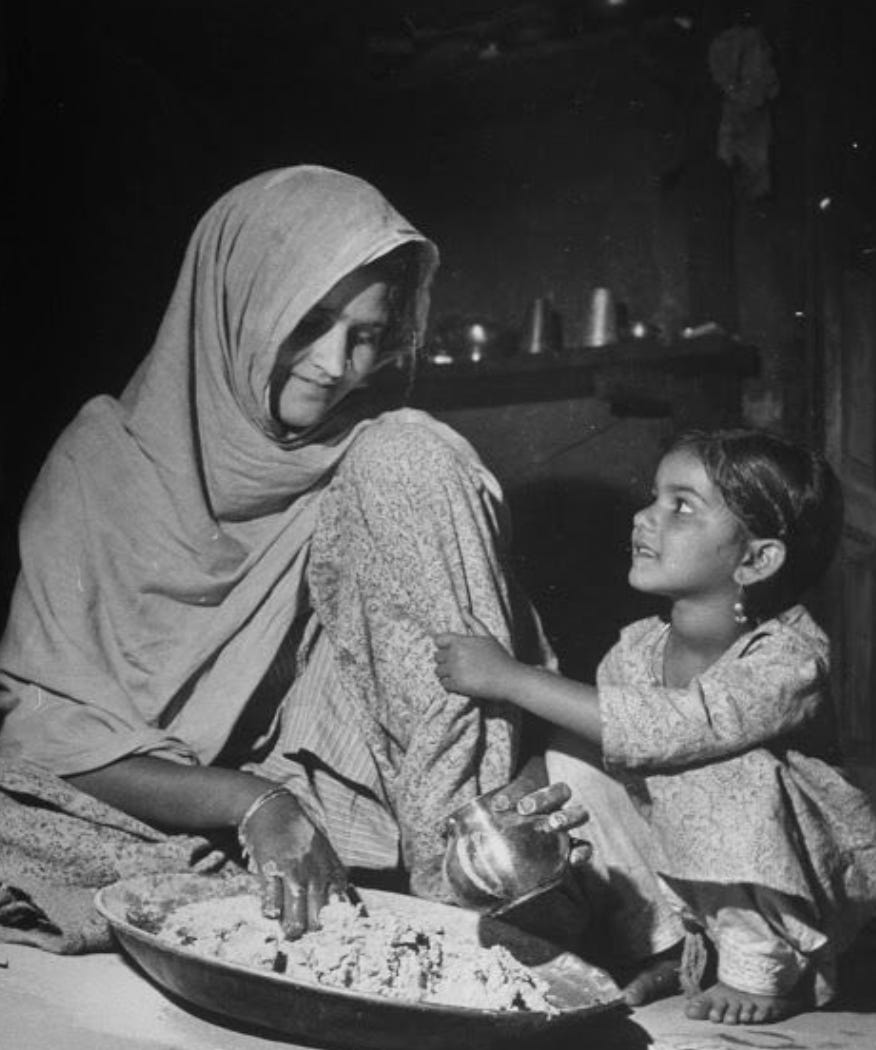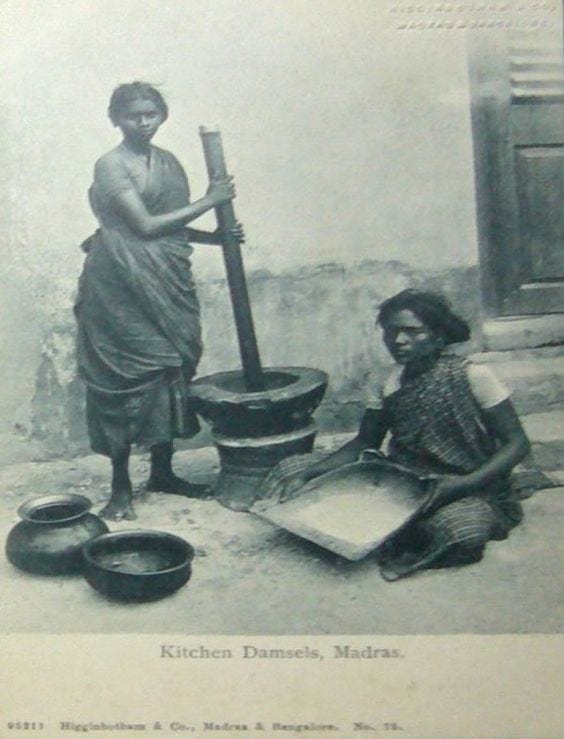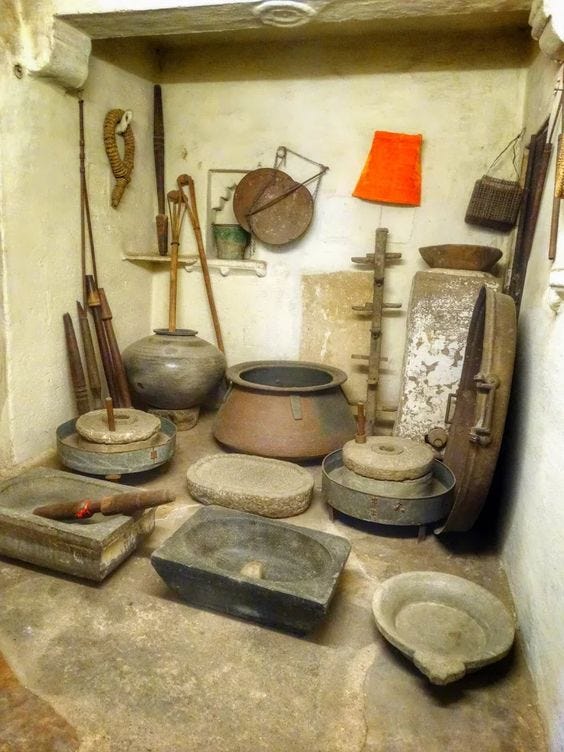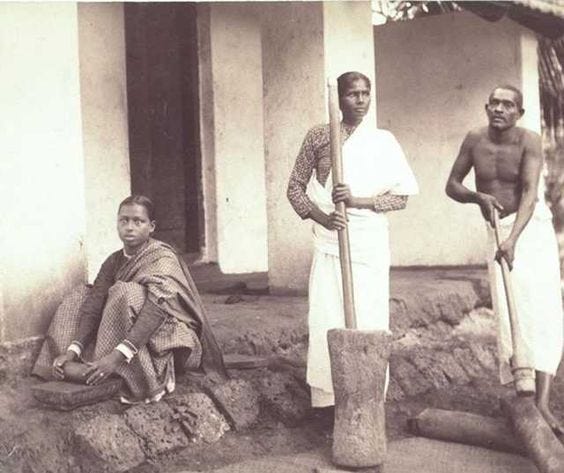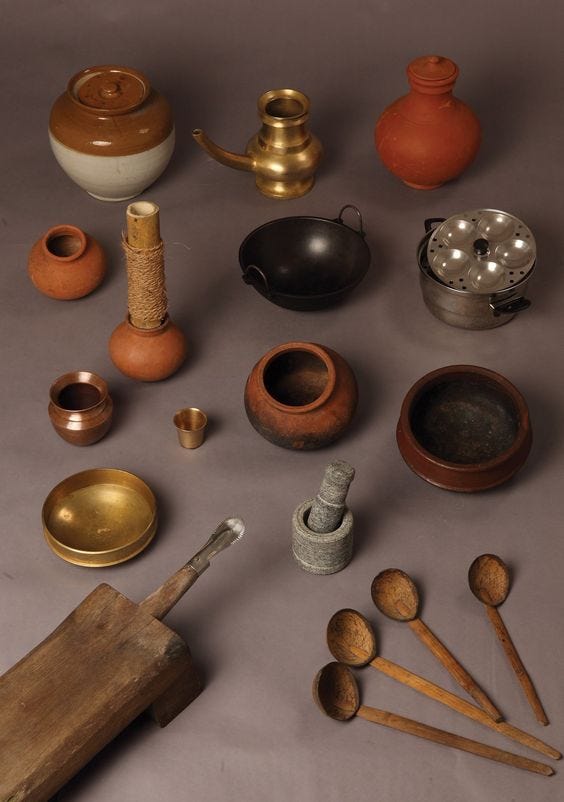Holy Contraptions - A Reverie for Obsolete Kitchen Tools
Today’s pickings Dear Reader, Welcome to Berkana! Today I present to you an evocative essay that comments on the interconnection between old kitchen objects, gender roles, food, and culture. Feel free to leave your opinion in the comment section! My awareness of the existence of Dida (maternal grandmother) was an unconscious one. It was like that of my awareness of my mother. Effortless, timeless, and etched without any intention. It was as if Dida carried the marrows of many women who came before her. And my recognition of her was a natural response to the whispers of the ancestresses in her bones. The intimacy we shared was like the delicate unfoldings of a cotton flower. She would wrap me in an embrace, and I disappeared in the folds of her freshly starched cotton saree. Cuddled in the warmth of her soft wrinkled hands, I never cared to wonder about the beauty and strength that those hands once possessed. They trembled often and looked old and weak. Her story was buried underneath the brown melanin patches on her saggy skin. Little did I know that these were the same hands that were once strong enough to sift several kilos of rice through the Kulo (U-shaped bamboo tray) and grind whole spices in Shil Nora (spice grinding stone). Though I was aware of her like one would be aware of the self, all her labors of love were unknown to me. Paarul - a name she would tattoo on her wrist using my pen, sitting beside me while I study. She was not much educated, but she could spell her name in Bangla (language). She was a tiny woman who used to trot about the household accomplishing chores with herculean strength. It was a household of seven people, and she was responsible for shopping, cooking, cleaning, and feeding her five children. My grandfather was trapped in his role as a breadwinner. He worked long hours and had neither time nor energy to do anything else. So, the little woman diligently carried the weight of the entire household. In her abode, the festivities were never dry or tasteless. The delicacies were made in excess and distributed among all the neighbors. She would measure up all her ingredients by the copper mugs and spoons. Her experienced eyes and gifted hands were the necessary scales for measurement. I proudly inherited the same matrilineal gift of precision. With her thick curls collected and pulled up in a bun, she dragged the heavy kitchen utensils across the cemented floor on special occasions to prepare rolled rice flour pancakes stuffed with coconut mixed with milk solids and cardamom. She finished it with her skillful sprinkle of sugar and love. I barely remember Dida being exhausted by her kitchen duties, which is not to say that she wasn’t. Like an ant carrying ten times her weight, she was tired to the point of breaking. But she would carry on with patience and grace, just the same as yesterday. She buried her exhaustion in the sweetness of the freshly sliced sweet potatoes that she would powder with a handful of flour and shallow fry on her cast iron skillet. The heat of wood charcoal and the smell of dimly lit kerosene lamps impregnated the heavy air of the East coast monsoon with comfort and familiarity of home. The fire baked the mud oven leaving behind a tsunami of soot and smoke as it slowly extinguished. The routine of making evening snacks on the angry hot and hissing skillets sometimes used to burn her hands. The marks of labor which she proudly carried to her grave. Kitchen and Gender RolesUntil recently, I never understood why the history of food seemed so naturally compelling to me. Since women’s roles were primarily limited to the kitchen, much of women’s history also resides within the premise of the kitchen. The kitchen was not exclusively for the women, many men also meticulously handled the role of a cook. However, we need to remember that men cooked for professional reasons, unlike women, for whom it was a wageless domestic obligation. In many families, the gender roles hold true even today. Food has defined gender roles since the beginning of civilization. Even a couple of generations ago, it was not unlikely to have heard a traditional patriarch remark snidely, “You belong in the kitchen” to his ward (wife/mother/daugher/-in-law). The term partner was pretty much non-existent in those times. The wife was not an equal. Not in those days. She assumed the role of a caregiver and nurturer. She also had to take up the menial household chores like cleaning, cooking, washing, etc. There was no second opinion on who will churn the butter and turn the grinding wheel. It was the role of the woman of the household. Her age, experience, and ability did not matter. By the time she was 14 years old, Dida was married and cooking for my grandfather regularly. Tools or Time CapsulesKitchen tools are not general objects lying around aimlessly in our cabinets of necessity. They are material specimens of culture. They equivocally narrate the story of the people who used them. The shape of the tools and the material they were made of indicated the strength needed to operate them. For instance, to grind curry paste for a family of seven like that of my Dida’s, she needed a big stone grinder weighing an average of 15 kilograms. Even if she was a small person, you could imagine that a woman who moved heavy stone equipment several times daily is not an ordinary woman. Although the term caregiver may cast a shadow of frailty on her, Dida was anything but a frail damsel. Hard physical labor was needed inside the kitchen to put hearty meals on the table, she did everything on her own. Learning about the stone grinder will help us quantify the physical strength needed to operate them. It will give us the data to set the foundation for debate on the controversial topic of the physical weakness of the female gender. The material of the equipment also indicated the circumstances they endured. If the Kadai (Indian wok) endured the heat, so did the woman who prepared the meal. The tools did not endure alone, a generation of dutiful women who sweated day and night to keep their loved ones fed endured just as much. Women inside Kitchen and TabooThe paraphernalia of Dida's kitchen was strange and fascinating. On the shelf next to condiments, the pious old woman used to keep the idols of her God. Not a single day would pass by without her reciting prayers and offering her food to God first. In India, food is an essential part of religious beliefs and superstitions. The tradition of fasting is thus a strong test of our endurance. People fast for days to prove their bhakti (devotion) to a deity, and then break the fast by eating a portion of the offerings made to God. This form of redistribution of the portion of the offering among the devotees is called prasad (reward for devotion). On such occasions, when religion crosses the threshold of the kitchen to form a connection with God, it brings its dogma and politics with it. Religion is a monopoly played by the corrupt power mongers who masquerade as holy. It is their job to wield the means of disparity and oppression. Religion, specially Vedic Hinduism, used the purity of a person’s body as an instrument to control the purity of their soul. It prohibits access to the praying chamber to anyone who is considered impure as per their rules. It included a targeted minority of cleaners, barbers, janitors, handicapped, and menstruating women. This was the immutable rule. Except when the temple is located within one’s own house. In such scenarios, the cleaner, barber, janitor, and handicapped all could enter their praying chamber but not the menstruating woman. She remains an outcast, even in her own home. And since in many families the kitchen was considered to be a space of purity and worship, menstruating women were not allowed inside the kitchen. This specifically feels like a betrayal. It is like reducing her down to her gender role and then flipping her out of the role because she goes through hormonal changes typical to womanhood. It is the punishment a woman bears for the unconscious workings of her body. The cost of being a woman in an oppressive household. I still remember standing dumbfound at the entrance of my Dida’s kitchen, wondering what I did so wrong after my mother smacked me across the face for touching Dida’s kitchen utensils while being on periods. Dida did not offer food to her God that day. I think that day she pitied me more than she pitied herself. The trauma was so deep that even today, when I get my periods, I feel like an outcast, like an impure woman whose womb is her constant enemy. How easy it was for the culture to turn my womanhood against my dignity. How original was the plan to make me despise myself for being who I am, for having a body that is capable of creating life, gradually declining from being a creator to being a specimen of impurity! Holy ContraptionsEven if Dida spent the rest of her life making delectable gooseberry, jujube, and mango pickles for me, I remained hyperaware of the old woman’s kitchen tools. After she got bedridden, her abandoned tools lay around challenging me to understand the life limitations of the women who used them. It was both intimidating and exhilarating to take up the challenge. I hoped to reconcile with the past of my ancestresses who, despite their innumerable hardships persisted. They were there showing up to their everyday hard labor in fields and kitchen so that I could be here now, free from the implicit gender-based slavery. Like the witch’s magical chamber of potions, Dida would decorate her colonial-style cupboards with ancient ceramic urns, which contained the happy concoction of fermented fruits, syrups, and numerous strange spices. I relished them, and the magic got infused in my blood. It stayed with me as a reminder of the strength of a tiny woman who used heavy rocks to crush spices and the stubborn chains of gender biases. Maybe now I have an answer for the nostalgic yearning I feel when I look at the modern motor and pestle sitting on my kitchen shelf. This feeling exists to remind me of the history and the strength of various women who designed and used these tools to perfection. Women for whom these tools were holy contraption. These devices put them on the map as cultural pioneers because they contributed towards one of the most impressive parts of Indian history - the history of food. List of Obsolete Kitchen EquipmentHere is an interesting list of some of the obsolete yet relevant kitchen tools, and their usage in traditional Indian cuisine. If you want to support my work ask a friend to subscribe |
Older messages
Riders of the Tempest - A series
Saturday, January 29, 2022
N°1 | Onake Obavva | The Pestle Warrior
Priestesses and Prostitutes
Saturday, January 22, 2022
A Life Spent in Servitude
Priestesses and Prostitutes - The Forgotten Tales of Devadasis
Saturday, January 8, 2022
An Introduction
..And miles to go before I sleep
Friday, December 31, 2021
Looking back into our journey together at Berkana this year
Have yourself a Merry Little Christmas!
Saturday, December 25, 2021
Dear Readers, Merry Christmas! I am dropping this mail today just to send love and blessings! Berkana stands up for everything fair and noble. So I am here to remind you that this Christmas be a star
You Might Also Like
Closes in 4 Hours • New Year's Day Newsletter Promo for Authors ●
Saturday, December 28, 2024
Book Your Spot Now in Our New Year's Day Holiday Books Email Newsletter ! Book Your Spot in Our New Year's Day Email Newsletter Enable Images
2025 Personal Development Goals 🎓
Friday, December 27, 2024
New year, new goals? ͏ ͏ ͏ ͏ ͏ ͏ ͏ ͏ ͏ ͏ ͏ ͏ ͏ ͏ ͏ ͏ ͏ ͏ ͏ ͏ ͏ ͏ ͏ ͏ ͏ ͏ ͏ ͏ ͏ ͏ ͏ ͏ ͏ ͏ ͏ ͏ ͏ ͏ ͏ ͏ ͏ ͏ ͏ ͏ ͏ ͏ ͏ ͏ ͏ ͏ ͏ ͏ ͏ ͏ ͏ ͏ ͏ ͏ ͏ ͏ ͏ ͏ ͏ ͏ ͏ ͏ ͏ ͏ ͏ ͏ ͏ ͏ ͏ ͏ ͏ ͏ ͏ ͏ ͏ ͏ ͏ ͏ ͏ ͏ ͏ ͏ ͏ ͏ ͏ ͏
The Weekender, December 27, 2024
Friday, December 27, 2024
The last one of the year
Closes Tonight • New Year's Day Newsletter Promo for Authors ●
Friday, December 27, 2024
Book Your Spot Now in Our New Year's Day Holiday Books Email Newsletter ! Book Your Spot in Our New Year's Day Email Newsletter Enable Images
🧙♂️ "Maybe next year will be different..."
Friday, December 27, 2024
How many times have you told yourself that? ͏ ͏ ͏ ͏ ͏ ͏ ͏ ͏ ͏ ͏ ͏ ͏ ͏ ͏ ͏ ͏ ͏ ͏ ͏ ͏ ͏ ͏ ͏ ͏ ͏ ͏ ͏ ͏ ͏ ͏ ͏ ͏ ͏ ͏ ͏ ͏ ͏ ͏ ͏ ͏ ͏ ͏ ͏ ͏ ͏ ͏ ͏ ͏ ͏ ͏ ͏ ͏ ͏ ͏ ͏ ͏ ͏ ͏ ͏ ͏ ͏ ͏ ͏ ͏ ͏ ͏ ͏ ͏ ͏ ͏ ͏ ͏ ͏ ͏ ͏ ͏ ͏ ͏ ͏
🎤 The SWIPES Email (Friday, December 27th, 2024)
Friday, December 27, 2024
The SWIPES Email Friday, December 27th, 2024 An educational (and fun) email by Copywriting Course. Enjoy! And MERRY CHRISTMAS OR WHATEVER HOLIDAY YOU CELEBRATE! Swipe: I loooveeee when images
Copywriting wins of 2024
Friday, December 27, 2024
The skill of copywriting is making content that attracts people... ...then eventually convert some people into an action (email signup, get a lead, or make a sale): The goal of copywriting is
23+ Great Ideas for Your 2025 Playbook
Friday, December 27, 2024
Plan for the best year with these tips. ͏ ͏ ͏ ͏ ͏ ͏ ͏ ͏ ͏ ͏ ͏ ͏ ͏ ͏ ͏ ͏ ͏ ͏ ͏ ͏ ͏ ͏ ͏ ͏ ͏ ͏ ͏ ͏ ͏ ͏ ͏ ͏ ͏ ͏ ͏ ͏ ͏ ͏ ͏ ͏ ͏ ͏ ͏ ͏ ͏ ͏ ͏ ͏ ͏ ͏ ͏ ͏ ͏ ͏ ͏ ͏ ͏ ͏ ͏ ͏ ͏ ͏ ͏ ͏ ͏ ͏ ͏ ͏ ͏ ͏ ͏ ͏ ͏ ͏ ͏ ͏ ͏ ͏ ͏ ͏ ͏
Closes Tomorrow • New Year's Day Newsletter Promo for Authors ●
Friday, December 27, 2024
Book Your Spot Now in Our New Year's Day Holiday Books Email Newsletter ! Book Your Spot in Our New Year's Day Email Newsletter Enable Images
🤯 You’re Not Going to Believe This…
Thursday, December 26, 2024
No One Wants This $165B Gift Contrarians, How does this make you feel? Like the Grinch stole our businesses' souls? Like Main Street packed up and left for the North Pole? This shot might look
